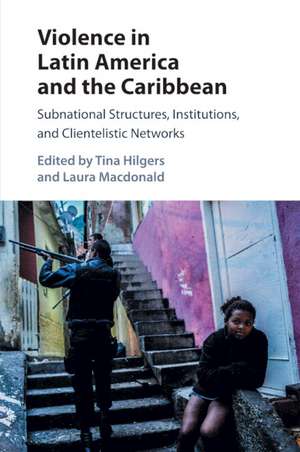Violence in Latin America and the Caribbean: Subnational Structures, Institutions, and Clientelistic Networks
Editat de Tina Hilgers, Laura Macdonalden Limba Engleză Paperback – 22 mai 2019
| Toate formatele și edițiile | Preț | Express |
|---|---|---|
| Paperback (1) | 288.04 lei 6-8 săpt. | |
| Cambridge University Press – 22 mai 2019 | 288.04 lei 6-8 săpt. | |
| Hardback (1) | 695.06 lei 6-8 săpt. | |
| Cambridge University Press – 13 sep 2017 | 695.06 lei 6-8 săpt. |
Preț: 288.04 lei
Nou
Puncte Express: 432
Preț estimativ în valută:
55.13€ • 59.91$ • 46.34£
55.13€ • 59.91$ • 46.34£
Carte tipărită la comandă
Livrare economică 21 aprilie-05 mai
Preluare comenzi: 021 569.72.76
Specificații
ISBN-13: 9781316643624
ISBN-10: 131664362X
Pagini: 310
Ilustrații: 6 b/w illus. 3 tables
Dimensiuni: 153 x 229 x 20 mm
Greutate: 0.46 kg
Editura: Cambridge University Press
Colecția Cambridge University Press
Locul publicării:New York, United States
ISBN-10: 131664362X
Pagini: 310
Ilustrații: 6 b/w illus. 3 tables
Dimensiuni: 153 x 229 x 20 mm
Greutate: 0.46 kg
Editura: Cambridge University Press
Colecția Cambridge University Press
Locul publicării:New York, United States
Cuprins
Introduction: how violence varies: subnational place, identity, and embeddedness Tina Hilgers and Laura Macdonald; 1. Not killer methods: a few things we got wrong when studying violence in Latin America Jean Daudelin; 2. The clientelist bases of police violence in democratic Mexico City Markus-Michael Müller; 3. Of criminal factions, UPPs, and militias: the state of public insecurity in Rio de Janeiro Robert Gay; 4. The garrison community in Kingston: urban violence, policing, private security, and implications for national security and civil rights in Jamaica Yonique Campbell and Colin Clarke; 5. The Salvadorian gang truce (2012–2014): insights on subnational security governance in El Salvador Gaëlle Rivard Piché; 6. Guns and butter: social policy, semi-clientelism, and efforts to reduce violence in Mexico City Lucy Luccisano and Laura Macdonald; 7. Subnational authoritarianism and democratization in Colombia: divergent paths in Cesar and Magdalena Kent Eaton and Juan Diego Prieto; 8. Agricultural boom, subnational mobilization, and variations of violence in Argentina Pablo Lapegna; 9. Patterns of violence and the dead ends of democratization in subnational Argentina Hugues Fournier; 10. Clientelism and state violence in subnational democratic consolidation in Bahía, Brazil Julián Durazo Herrmann; Conclusion: learning from subnational violence Tina Hilgers and Laura Macdonald.
Recenzii
'Violence and fear have become a daily staple for Latin Americans. In Violence in Latin America and the Caribbean Tina Hilgers and Laura Macdonald have made a major contribution at two levels. In their introduction and conclusion they offer a superb scholarly synthesis of the phenomenon and the literature, while in the chapters they have compiled, the reader will find a good selection of topics and countries. A book that has all the ingredients to become a classic.' Sergio Aguayo, El Colegio de México
'With its focus on meso-level analysis and the interstices of sociology and political science, Hilgers and Macdonald's volume offers an important contribution to the literature on violence in Latin American and the Caribbean.' Enrique Desmond Arias, George Mason University, Washington, DC
'Hilgers and Macdonald´s edited volume offers an impressive overview of the character, causes and consequences of violence across the Americas. The region's staggering rates of homicide and violent crime are widely known. Yet the book's contributing authors dive below the national statistics to reveal the micro-determinants of violence. Along the way, they demonstrate how Latin American police can be violence entrepreneurs, how prisons often double as crime colleges, and the way widespread clientelism preserves an unequal and volatile status quo. The book is essential reading for public security and development specialists looking for a deeper understanding of the drivers of violence in Latin America and the Caribbean, and insights into how to avoid repeating the mistakes of the past.' Robert Muggah, Research Director, Instituto Igarapé, Brazil
'Readers will come away from this worthy volume with greater appreciation of why violence in Latin America and the Caribbean has been so intractable - it is in fact a multifaceted problem, varying across the region, with many and diverse causes and implications.' Tom Long, International Affairs
'A landmark in the study of violence.' Patrick Heller, Canadian Journal of Political Science
'By highlighting new relations between clientelism and violence, this book rightly draws our attention towards the power structures in which violence is immersed and to the ways in which it becomes lucrative to powerful actors … Violence in Latin America and the Caribbean is built around thought-provoking questions that help revitalize the study of the problem and the potential solutions.' Alexandra Abello Colak, Journal of Latin American Studies
'With its focus on meso-level analysis and the interstices of sociology and political science, Hilgers and Macdonald's volume offers an important contribution to the literature on violence in Latin American and the Caribbean.' Enrique Desmond Arias, George Mason University, Washington, DC
'Hilgers and Macdonald´s edited volume offers an impressive overview of the character, causes and consequences of violence across the Americas. The region's staggering rates of homicide and violent crime are widely known. Yet the book's contributing authors dive below the national statistics to reveal the micro-determinants of violence. Along the way, they demonstrate how Latin American police can be violence entrepreneurs, how prisons often double as crime colleges, and the way widespread clientelism preserves an unequal and volatile status quo. The book is essential reading for public security and development specialists looking for a deeper understanding of the drivers of violence in Latin America and the Caribbean, and insights into how to avoid repeating the mistakes of the past.' Robert Muggah, Research Director, Instituto Igarapé, Brazil
'Readers will come away from this worthy volume with greater appreciation of why violence in Latin America and the Caribbean has been so intractable - it is in fact a multifaceted problem, varying across the region, with many and diverse causes and implications.' Tom Long, International Affairs
'A landmark in the study of violence.' Patrick Heller, Canadian Journal of Political Science
'By highlighting new relations between clientelism and violence, this book rightly draws our attention towards the power structures in which violence is immersed and to the ways in which it becomes lucrative to powerful actors … Violence in Latin America and the Caribbean is built around thought-provoking questions that help revitalize the study of the problem and the potential solutions.' Alexandra Abello Colak, Journal of Latin American Studies
Descriere
This volume examines violence across Latin America and the Caribbean to demonstrate the importance of subnational analysis over national aggregates.















